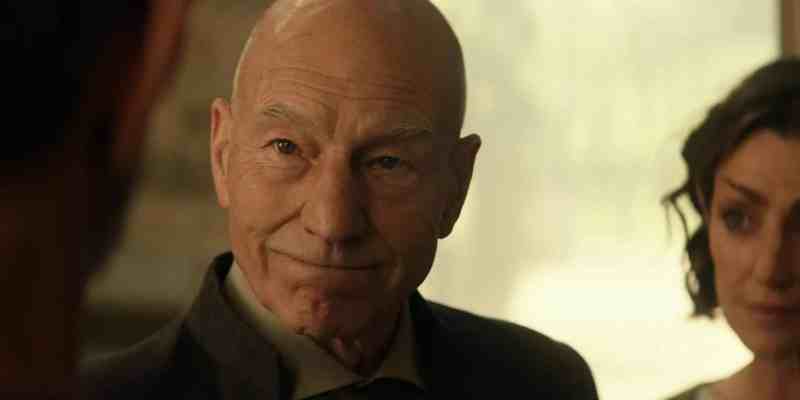The following contains spoilers for Star Trek: Nemesis, a movie old enough to vote, and speculation for Star Trek: Picard, which could turn out to be a spoiler if the author is as smart as he thinks he is.
First, Star Trek: Nemesis killed off Commander Data. Then it killed off Star Trek.
The 2002 film was Trek’s tenth trip to the theaters. In broad strokes, the storyline sounded exciting: The Enterprise would be going to Romulus for the first time in cinematic history, a planet full of spies and schemers with righteous shoulder pads. Patrick Stewart’s Picard would be squaring off against Tom Hardy’s Shinzon, a younger clone of Picard who possessed all the older man’s intelligence and cunning but none of his morals or restraint. And Data, the beloved android crewman, would be facing a dark doppelganger of his own in B-4, a prototype model of Data himself.
The movie begins with the long-awaited wedding of Commander Riker and Counselor Troi, while Data serenades them with “Blue Skies.” The movie ends with Data sacrificing himself to save the crew of the Enterprise in a moment that is an obvious parallel to Spock’s sacrifice in Wrath of Khan, while also tragically proving in his last moments that Data had truly evolved into full humanity. On paper, at least, the movie should’ve given us everything we wanted as fans.

The results, however, were disastrous. The reviews rolled in, each more scathing than the last. The Rotten Tomatoes score for the movie hovers at 38%, and even the generally more forgiving audience rating can’t break through to “Fresh.” The movie brought in only $67 million worldwide, making it the worst-grossing Trek movie of all time by far.
The behind-the-scenes stories weren’t much better. Rumors say the director, Stuart Baird, had never watched Star Trek and didn’t know much about it. He called actor LeVar Burton “Laverne” by accident repeatedly and seemed to think that his character, Geordi, was an alien. (He’s a normal human with prosthetic eyes.) His lack of care and detail apparently made it to the screen.
The results were obvious and immediate: Paramount Pictures halted production on any new Trek movies, specifically any with the Next Generation crew. Stuart Baird has not directed a film since.
From 2002 until J.J. Abrams rebooted everything in 2009, there were no new Trek movies or TV shows, which is the longest Trek fans have ever had to go without any new content (as long as you count the Animated Series from the ’70s, which I do). For Trek fandom, these seven years were truly the darkest times.
By contrast, we’re currently glutted with new Trek content, with a new movie rumored to be in production and Star Trek: Discovery and Short Treks popping up on CBS All Access. Now, this week, Star Trek: Picard takes to the stars again, and with it the franchise hopes to undo its biggest mistake — without actually undoing anything.

Picard looks, by all accounts, to be a direct response to and continuation of the events of Nemesis in a lot of ways. The trailers and featurettes that have dropped over the past several months imply that Data has remained dead since the events of that movie — and more damningly, that Starfleet may have taken what remained of Data and used that information to build an entire servile race of androids. The trailers are full of blink-and-you-miss-it shots of pale-skinned, golden-eyed people who are decidedly not Data but could easily be his cousins. By all accounts Jean-Luc Picard has been out of Starfleet for over a decade, and this could easily be the moral outrage that prompted Trek’s most philosophical captain to abandon his post.
The important thing here, however, is that it looks like Picard aims to undo the travesty of Nemesis by making its events mean more in retrospect.
It’s easy to undo things on a Star Trek show — you say wormhole this, tachyon that, reverse the polarity on the main deflector and then bam: You can resurrect Spock, create entire alternate timelines, meet Abraham Lincoln, do whatever you want. Star Trek: Voyager definitely swapped out their Harry Kim at least a couple times, and Deep Space Nine technically didn’t end with the same Miles O’Brien it started with. Next Generation accidentally made a second Will Riker in a transporter accident, and that dude is still out there somewhere.
It would be easy, then, to resurrect Data in a variety of ways. It would also most likely suck.
One of the rules of improv theatre is the rule of “yes, and.” When someone else on stage gives you something, be it a general premise or just the sort of energy they’re bringing into the scene, the only way you can continue onward is to accept what you’ve been given and add to it. Saying “no, but” to what they present you brings the scene to a halt, trips up your audience, and generally ruins the scene, as demonstrated aptly by Liam Neeson in this skit:
One of the critiques leveled at the recent Star Wars: The Rise of Skywalker movie is that it did not “yes, and” the events of The Last Jedi, instead opting to forcibly redirect the narrative back onto the tracks J.J. Abrams wanted for it. Regardless of how you feel about The Last Jedi, there are several moments that feel like jarring contradictions or shifts in tone. Doing that kind of thing is a writing gamble — one that erodes the audience’s faith in what they’re watching. If things don’t stick, if the consequences of a moment aren’t guaranteed to play out in the future, then watching them stops mattering in the present.
So, Picard appears to have done the only thing it could do: It took Data’s death, a wildly unpopular move for the franchise, and ran with it. They’ve made it wildly unpopular for Jean-Luc Picard as well, a moment that haunts and horrifies him. He’s left Starfleet behind for years, just as Patrick Stewart left behind Star Trek. The show appears to feature the Romulans heavily, moving to run with and course-correct decisions that landed with a thud in the last movie.
And the most recent trailers for the show feature a woman quietly singing “Blue Skies” by Irving Berlin, which Data sang at Riker and Troi’s wedding. In the movie, this scene was hammy and awkward, a moment of attempted comedy in a franchise that has never been known for doing comedy well. But now, it’s a reference to the very last time the whole crew of the Enterprise was together and happy, the hopeful opening moments of a movie that ultimately left fans disappointed and bitter — and silenced Trek for a decade.
Star Trek: Nemesis will never be a good movie. But if Star Trek: Picard can take the narrative threads left behind and run with them, it will retroactively become a better one.
